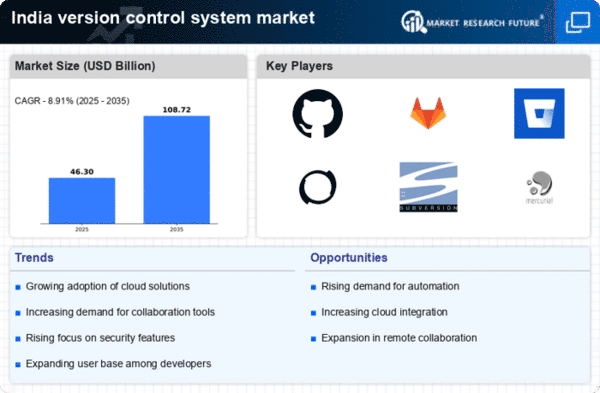Rising Cybersecurity Concerns
The version control-system market in India is increasingly shaped by rising cybersecurity concerns among organizations. As data breaches and cyber threats become more prevalent, companies are prioritizing security measures to protect their intellectual property and sensitive information. Version control systems play a crucial role in safeguarding code repositories and ensuring secure access controls. The market data indicates that the cybersecurity market in India is projected to grow at a CAGR of 25% over the next five years. This heightened focus on security is likely to drive investments in version control systems, as organizations seek solutions that offer robust security features and compliance with industry standards.
Growing Demand for Collaboration Tools
The version control-system market in India is experiencing a notable surge in demand for collaboration tools. As organizations increasingly adopt remote and hybrid work models, the need for effective collaboration solutions has become paramount. Version control systems facilitate seamless collaboration among distributed teams, allowing multiple users to work on the same project without conflicts. This trend is reflected in the market data, which indicates that the collaboration software segment is projected to grow at a CAGR of 15% over the next five years. The version control-system market is thus positioned to benefit from this growing demand, as companies seek to enhance productivity and streamline workflows.
Increase in Software Development Projects
The version control-system market in India is significantly influenced by the rise in software development projects across various sectors. With the digital transformation initiatives gaining momentum, businesses are investing heavily in software development to enhance their operational efficiency. According to recent statistics, the software development industry in India is expected to reach a valuation of $350 billion by 2025. This growth directly correlates with the version control-system market, as developers require robust version control solutions to manage code changes, track revisions, and ensure project integrity. Consequently, the increasing number of software projects is likely to drive the demand for version control systems.
Emphasis on Agile Development Methodologies
The version control-system market in India is witnessing a shift towards agile development methodologies, which prioritize flexibility and rapid iteration. Agile practices necessitate the use of version control systems to manage code changes efficiently and support continuous integration and delivery. As organizations adopt agile frameworks, the need for reliable version control solutions becomes critical. Market analysis suggests that agile adoption in India is expected to grow by 20% in the coming years, further propelling the version control-system market. This emphasis on agile methodologies indicates a strong alignment between development practices and the tools required to support them.
Expansion of Educational Institutions and Training Programs
The version control-system market in India is benefiting from the expansion of educational institutions and training programs focused on software development. As more universities and technical institutes incorporate version control systems into their curricula, a new generation of developers is being trained in these essential tools. This educational emphasis is expected to create a skilled workforce that is proficient in using version control systems, thereby increasing their adoption in the industry. The version control-system market is likely to see a positive impact from this trend, as the growing number of trained professionals will drive demand for these systems in various sectors.
















